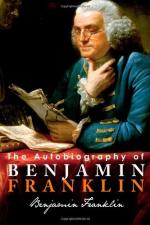John was bred a dyer, I believe of woolens. Benjamin was bred a silk dyer, serving an apprenticeship at London. He was an ingenious man. I remember him well, for when I was a boy he came over to my father in Boston, and lived in the house with us some years. He lived to a great age. His grandson, Samuel Franklin, now lives in Boston. He left behind him two quarto volumes, Ms., of his own poetry, consisting of little occasional pieces addressed to his friends and relations, of which the following, sent to me, is a specimen.<2> He had formed a short-hand of his own, which he taught me, but, never practising it, I have now forgot it. I was named after this uncle, there being a particular affection between him and my father. He was very pious, a great attender of sermons of the best preachers, which he took down in his short-hand, and had with him many volumes of them. He was also much of a politician; too much, perhaps, for his station. There fell lately into my hands, in London, a collection he had made of all the principal pamphlets, relating to public affairs, from 1641 to 1717; many of the volumes are wanting as appears by the numbering, but there still remain eight volumes in folio, and twenty-four in quarto and in octavo. A dealer in old books met with them, and knowing me by my sometimes buying of him, he brought them to me. It seems my uncle must have left them here, when he went to America, which was about fifty years since. There are many of his notes in the margins.
<2> Here follow in the margin
the words, in brackets, “here
insert it,” but the poetry is not given.
Mr. Sparks
informs us (Life of Franklin, p. 6) that
these volumes
had been preserved, and were in possession
of Mrs. Emmons,
of Boston, great-granddaughter of their author.
This obscure family of ours was early in the Reformation, and continued Protestants through the reign of Queen Mary, when they were sometimes in danger of trouble on account of their zeal against popery. They had got an English Bible, and to conceal and secure it, it was fastened open with tapes under and within the cover of a joint-stool. When my great-great-grandfather read it to his family, he turned up the joint-stool upon his knees, turning over the leaves then under the tapes. One of the children stood at the door to give notice if he saw the apparitor coming, who was an officer of the spiritual court. In that case the stool was turned down again upon its feet, when the Bible remained concealed under it as before. This anecdote I had from my uncle Benjamin. The family continued all of the Church of England till about the end of Charles the Second’s reign, when some of the ministers that had been outed for nonconformity holding conventicles in Northamptonshire, Benjamin and Josiah adhered to them, and so continued all their lives: the rest of the family remained with the Episcopal Church.




